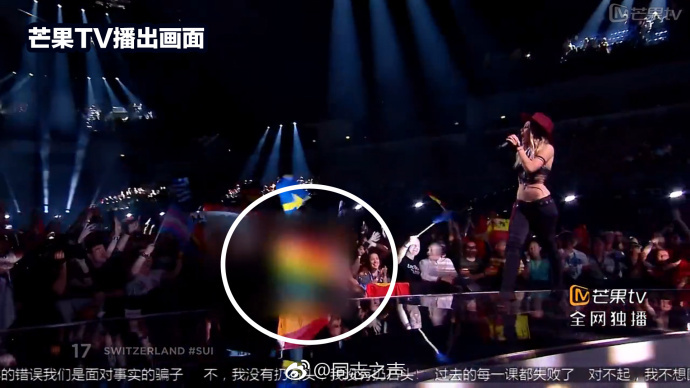China forming acceptance of LGBT people on own pace
Global Times
1526233760000

Mango TV masks LGBT elements from Eurovision Song Contest (Photo: Weibo)
Is Chinese censorship on the rise? asked BBC Saturday. BBC is not the only mainstream Western media to have doubts. The Economist also lashed out at Beijing by claiming "a recent crackdown on displaying tattoos is part of a broader effort to 'clean up' subcultures."
It all started when Mango TV, an online video platform of Chinese broadcaster Hunan TV, cut off LGBT (lesbian, gay, bisexual, and transgender) elements from its broadcast of Eurovision Song Contest, an annual international TV song competition in Europe.
It is not surprising to see that the incident caused a sensation among Western media. If the same thing occurred in the US or Europe, where an increasing number of countries have passed bills legalizing same-sex marriage over the past few years, it can be at odds with political correctness.
But the situation is different in China. Compared with decades ago, Chinese society's openness and acceptance toward LGBT people are much improved. There is no persecution against them like in the Islamic world, or bullying or humiliation toward them like in some parts of the US. Their lives are safe and can hardly be interrupted by strangers. For a country, where Confucianism and the idea of carrying on the family line are deeply imbedded in its culture, progress is not easily achieved.
Granted, China's pace of forming an accepting environment for LGBT people is slower than that in the West. But even in the West, public opinion and laws of countries and regions are not unanimous on the issue. Before, June 26, 2015, when US Supreme Court ruled that same-sex couples can marry nationwide, 13 states across the nation had battled against it. Even after the ruling, Texas office clerks still refused to issue marriage licenses to same-sex couples.
During Hillary Clinton's presidential campaign in 2016, she said "I am running for president to stand up for the fundamental rights of LGBT Americans." Yet as a candidate in 2008, her stance was quite different. Let alone in 1996, when her husband, Bill Clinton, then US president, signed the Defense of Marriage Act, defining marriage strictly as the union of a man and woman for the purposes of federal law.
It is not a matter of censorship, but the evolution of society. In light of China's cultural background, Mango TV chose to avoid possible controversies. But not every Chinese media is skirting around the topic.
In 2015, a popular Chinese online talk show Qi Pa Shuo, or U Can U Bibi, devoted one episode to the theme "whether gays should come out of the closet to their parents." Gay films including Brokeback Mountain and Lan Yu are available on the Chinese Internet.
China's stance on the issue is influenced by the world and is progressing step by step. The move of Mango TV is not necessarily correct. Perhaps greater flexibility leading to a more open society will be more welcomed. But is it really necessary for Western media to impose their political correctness on China ?


